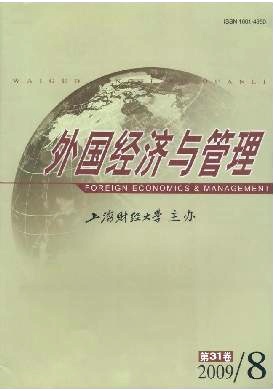泰罗主义、泰罗文本与心理革命辨析
外国经济与管理 2009 年 第 31 卷第 08 期, 页码: - 10
摘要
参考文献
摘要
泰罗认为,科学管理的实质是心理革命。然而,科学管理在实践中却遭到了工人们的反对,也未能实现劳资双方的心理革命。本文从人性假设、科学管理的方法论、科学共同体内部的观念差异,以及心理革命这一概念自身的缺陷等方面探讨了泰罗主义如何排斥心理革命,从而使其偏离泰罗的科学管理文本这个问题,并认为泰罗主义对心理革命的排斥,又外化为今天管理理论中科学主义范式与人本主义范式的对立。
[1]Frederick WTaylor.Taylor’s testi mony before the special house committee(1912)[C].Reprinted in Taylor,F W(Ed.).Scientificmanagement[A].London:Harper&Row,1964.
[2]Frederick WTaylor.Shop management(1903)[A].Reprintedin Taylor,F W(Ed.).Scientific management[C].London:Harper&Row,1964.
[3]Frederick W Taylor.The principles of scientific management(1911)[A].Reprinted in Taylor,F W(Ed.).Scientific management[C].London:Harper&Row,1964.
[4]Sigmund Wagner-Tsukamoto.Aninstitutional economic reconstruction of scientific management:On the lost theoretical logic of tay-lorism[J].Academy of Management Review,2007,32(1):105-117.
[5]Charles Handy.The hungry spirit:Beyond capitalism—Aquest for purpose in the modern world[M].London:Hutchinson,1997.
[6]Fabrizio Ferraro,Jeffery Pfeffer,and Robert I Sutton.Economics language and assumptions:Howtheory can become self-fulfilling[J].Academy of Management Review,2005,30(1):8-24.
[7]Sumantra Ghoshal.Bad theories are destroying good practices[J].Academy of Management&Education,2005,4(1):75-91.
[8]Marvin R Weisbord.Productive workplaces:Organizing and managingfor dignity,meaning and community[M].San Francisco,Cali-fornia:Jossey-Bass,1991.
[9]Gareth Morgan,and Linda Smircich.The case for qualitative research[J].The Academy of Management Review,1980,5(4):491-500.
[10]Joseph Kupfer.The ethics of genetic screeningin the workplace[J].Business Ethics Quarterly,1993,3(1):17-25.
[11]Robert Kanigel.The one best way:Frederick Winslow Taylor and the enigma of efficiency(Sloan Technology Series)[M].NewYork:Viking Penguin,1997.
[12]Marta B Calós,and Linda Smircich.Past post modernism?Reflections andtentative directions[J].Academy of Management Review,1999,24(4):649-671.
[13]Karen Golden-Biddle,Karen Locke,and Trish Reay.Reconceptualizing knowledge transfer:Toward a theory of knowledge move-ment as communicative process[R].Working Paper,University of Alberta,Canada,2002.
[14]Mayer N Zald.Organization studies as a scientific and humanistic enterprise:Toward a reconceptualization of the foundations of thefield[J].Organization Science,1993,4(4):513-528.
[15]Mayer N Zald.More fragmentation?Unfinished businessinlinkingthe social sciences andthe humanities[J].Administrative ScienceQuarterly,1996,41(2):251-261.
[16]Stephen R Barley,and Gideon Kunda.Design and devotion:Surges of rational and normativeideologies of control in managerial dis-course[J].Administrative Science Quarterly,1992,37(3):363-399.
[17]Joseph MJuran.Taylor’s systemand quality control in Juran and his quality thought[M].New York:Harper&Row,1988.
[18]Eric Abrahamson.The emergence and prevalence of employee management rhetorics:The effects of long waves,labor unions,andturnover,1875 to 1992[J].The Academy of Management Journal,1997,40(3):491-533.
[19]Martin Kilduff,and Ajay Mehra.Post modernismand organizational research[J].The Academy of Management Review,1997,22(2):453-481.
[20]Andrew H Van de Ven,and Paul E Johnson.Knowledge for theory and practice[J].Academy of Management Review,2006,31(4):802-821.
[2]Frederick WTaylor.Shop management(1903)[A].Reprintedin Taylor,F W(Ed.).Scientific management[C].London:Harper&Row,1964.
[3]Frederick W Taylor.The principles of scientific management(1911)[A].Reprinted in Taylor,F W(Ed.).Scientific management[C].London:Harper&Row,1964.
[4]Sigmund Wagner-Tsukamoto.Aninstitutional economic reconstruction of scientific management:On the lost theoretical logic of tay-lorism[J].Academy of Management Review,2007,32(1):105-117.
[5]Charles Handy.The hungry spirit:Beyond capitalism—Aquest for purpose in the modern world[M].London:Hutchinson,1997.
[6]Fabrizio Ferraro,Jeffery Pfeffer,and Robert I Sutton.Economics language and assumptions:Howtheory can become self-fulfilling[J].Academy of Management Review,2005,30(1):8-24.
[7]Sumantra Ghoshal.Bad theories are destroying good practices[J].Academy of Management&Education,2005,4(1):75-91.
[8]Marvin R Weisbord.Productive workplaces:Organizing and managingfor dignity,meaning and community[M].San Francisco,Cali-fornia:Jossey-Bass,1991.
[9]Gareth Morgan,and Linda Smircich.The case for qualitative research[J].The Academy of Management Review,1980,5(4):491-500.
[10]Joseph Kupfer.The ethics of genetic screeningin the workplace[J].Business Ethics Quarterly,1993,3(1):17-25.
[11]Robert Kanigel.The one best way:Frederick Winslow Taylor and the enigma of efficiency(Sloan Technology Series)[M].NewYork:Viking Penguin,1997.
[12]Marta B Calós,and Linda Smircich.Past post modernism?Reflections andtentative directions[J].Academy of Management Review,1999,24(4):649-671.
[13]Karen Golden-Biddle,Karen Locke,and Trish Reay.Reconceptualizing knowledge transfer:Toward a theory of knowledge move-ment as communicative process[R].Working Paper,University of Alberta,Canada,2002.
[14]Mayer N Zald.Organization studies as a scientific and humanistic enterprise:Toward a reconceptualization of the foundations of thefield[J].Organization Science,1993,4(4):513-528.
[15]Mayer N Zald.More fragmentation?Unfinished businessinlinkingthe social sciences andthe humanities[J].Administrative ScienceQuarterly,1996,41(2):251-261.
[16]Stephen R Barley,and Gideon Kunda.Design and devotion:Surges of rational and normativeideologies of control in managerial dis-course[J].Administrative Science Quarterly,1992,37(3):363-399.
[17]Joseph MJuran.Taylor’s systemand quality control in Juran and his quality thought[M].New York:Harper&Row,1988.
[18]Eric Abrahamson.The emergence and prevalence of employee management rhetorics:The effects of long waves,labor unions,andturnover,1875 to 1992[J].The Academy of Management Journal,1997,40(3):491-533.
[19]Martin Kilduff,and Ajay Mehra.Post modernismand organizational research[J].The Academy of Management Review,1997,22(2):453-481.
[20]Andrew H Van de Ven,and Paul E Johnson.Knowledge for theory and practice[J].Academy of Management Review,2006,31(4):802-821.
引用本文
郭英, 高良谋. 泰罗主义、泰罗文本与心理革命辨析[J]. 外国经济与管理, 2009, 31(8): 0–10.
导出参考文献,格式为:
下一篇:组织间关系的社会逻辑观评介





 8109
8109  461
461

